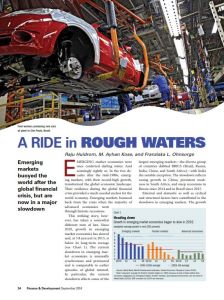Join getAbstract to access the summary!

Join getAbstract to access the summary!
Raju Huidrom, M. Ayhan Kose and Franziska L. Ohnsorge
A Ride in Rough Waters
Emerging markets buoyed the world after the global financial crisis, but are now in a major slowdown.
Finance & Development Magazine, 2016
What's inside?
Decelerating growth in the BRICS countries could have ripple effects across the world economy.
Recommendation
After the 2008 financial crisis, the largest developing markets – Brazil, Russia, India, China and South Africa (BRICS) – provided a counterbalance in economic growth to the lagging developed countries. But then the BRICS saw their advancement start to decelerate. In this incisive analysis, economists Raju Huidrom, M. Ayhan Kose and Franziska L. Ohnsorge point out how the BRICS countries’ extensive economic integration causes their growth declines to reverberate regionally and around the world. getAbstract recommends this focused and information-packed report to executives, investors and others watching the global economy.
Summary
About the Authors
Raju Huidrom, M. Ayhan Kose and Franziska L. Ohnsorge are economists at the World Bank.





















Comment on this summary